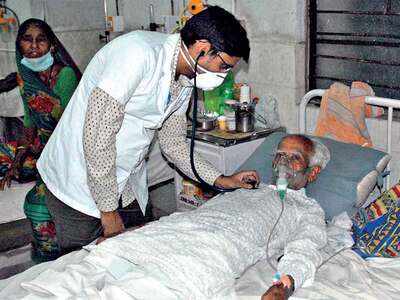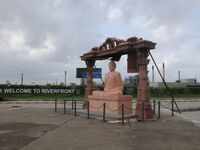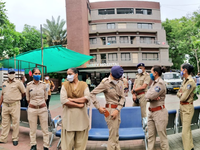It’s official: Gujarat faces 54% shortage of specialist doctors

The crisis arose because the State government dragged its feet over hiring permanent doctors for decades
NHSRC report reveals Gujarat had sanctioned fewer posts than actual requirement of healthcare providers. Even on these seats, 28% posts of MBBS/Medical Officers, 27% posts of ANMs, 27% posts of dentists and 24% of lab technicians remained vacant
Now, even the Centre has said it: Gujarat’s public healthcare system wasfloundering even before the State was hit by the coronavirus pandemic . Compiled by the National Health Systems Resource Centre and National Health Mission , The Human Resource for Health in District Public Health Systems of India Report 2020 revealed that 54% posts of specialist doctors and 28% posts of Medical Officers in the State lay empty till last March.
The impact was felt in the very first Covid wave when the State health department ordered medical students to begin training as ‘helpers’ inCoviddesignated hospitals . The reason given: “lack of manpower in the State’s health sector” due to Covid pandemic.
The report clearly shows that Gujarat had sanctioned fewer posts than the actual requirement of healthcare providers. What is worse is that the government did not fill up even these posts.
The data has been collected over 2017-18 and 2018-19, and includes all public healthcare facilities like district hospitals,Sub-District Hospitals , CHCs and PHCs. It calculates the actual number of healthcare providers needed, the number of posts sanctioned by the state governments, and the number of posts actually in six major categories of auxiliary nurse midwife (ANM), staff nurse, lab technicians, MBBS/medical officers, specialists, and dentists.
Requirement vs sanctioned posts
The report states that in three of the six categories, Gujarat has not even sanctioned posts as per the national requirement guidelines. The State has sanctioned only 72% of required number of nurses, and 53% of required ANMs. The worst category, however, is that of specialist doctors with master’s degree. The Gujarat government has sanctioned just 28% posts against the actual requirement.
On the other hand, the State has sanctioned 113% posts for lab techs, 115% for MOs and 103% for dentists.
Sanctioned vs vacant posts
What makes the whole situation worse is that while the sanctioned human resources indistrict healthcare systems is fewer than the actual requirement as per the population, Gujarat does not even have the sanctioned strength.
Against five public healthcare providers sanctioned per 10,000 by the state government, there are only four providers (specialists, MOs, nurses, ANMs) per 10,000 people in Gujarat.
The report stated a 54% vacancy in specialist doctors across Gujarat. This means though only 28% posts of required specialist doctors were sanctioned, more than half of even these few posts lay vacant. Mirror had reported about the State facing severe shortage ofsenior doctors during the peak of the first wave of coronavirus (Dear Gujarat govt, where are senior doctors we need to fight our Covid-19 battle?; AM, July 25). The crisis arose because the State government has been dragging its feet over hiring permanent doctors for decades. Even in the midst of the pandemic, its solution has been to hire doctors on 11-month contract.
Meanwhile, there is also a 28% vacancy in sanctioned MBBS doctors and Medical Officers (MOs) posts, as well as 27% vacancy in sanctioned posts of ANMs in the State. The vacancy in sanctioned posts of dentists also stands at 27%. There is a 24% dearth in the number of sanctioned Lab Technicians. The least number of vacancies at 9% is in sanction posts for staff nurses.
‘State govt updating recruitment rules’
To this, Principal Secretary (Health) Jayanti Ravi said, “We have given a big thrust towards medical manpower since December 2019, well before Covid-19. One big drive to streamline hiring is to update recruitment rules of 800 cadres, some of which had not changed for more than 40 years."
On vacancies of health personnel across the board, Dr Jayanti Ravi said, “We have multiple schemes now for specialists like the CM Setu. Further, we have sought appointments for almost 6,000 posts to be filled and have sent this demand forth to the Gujarat Public Service Commission (GPSC) and other bodies. We expect this to fill up posts across the health sector in Gujarat.”
On specialists per se, the Principal Secretary said, “The government had taken a policy decision to allow specialist doctors to join public service on 11-month contract even if they continue with private practice.” However, the notification for this was issued only during the onset of Covid-19 as the public healthcare system required more doctors to join the workforce.
“We are increasing seats for specialists. We now have about 500 DNB seats apart from 3,000 general specialist seats,” added Dr Jayanti Ravi. Whether this will increase public health manpower, however, is left to be seen.
Gujarat has faced massive problems with medical students who are bonded to rural service. Mirror had on February 17, 2020, reported ‘86% medical students in Gujarat refused rural service in five years’ as they chose to relinquish their medical bond amount to the state in return for skipping the mandatory rural service even when Gujarat faced massive shortfall of doctors. The Principal Secretary said, “The government was trying to leverage with them and had changed the policy last year wherein the bond amount has been increased and time had been cut down from three years to one year.”
Notably, after the Health Commissioner issued orders for 925 MBBS graduates of 2020 to appear for bond service across Gujarat, only 80 of 143 in Ahmedabad had come forth after being served notices.
Now, even the Centre has said it: Gujarat’s public healthcare system was
The impact was felt in the very first Covid wave when the State health department ordered medical students to begin training as ‘helpers’ in
The report clearly shows that Gujarat had sanctioned fewer posts than the actual requirement of healthcare providers. What is worse is that the government did not fill up even these posts.
The data has been collected over 2017-18 and 2018-19, and includes all public healthcare facilities like district hospitals,
Requirement vs sanctioned posts
The report states that in three of the six categories, Gujarat has not even sanctioned posts as per the national requirement guidelines. The State has sanctioned only 72% of required number of nurses, and 53% of required ANMs. The worst category, however, is that of specialist doctors with master’s degree. The Gujarat government has sanctioned just 28% posts against the actual requirement.
On the other hand, the State has sanctioned 113% posts for lab techs, 115% for MOs and 103% for dentists.
Sanctioned vs vacant posts
What makes the whole situation worse is that while the sanctioned human resources in
Against five public healthcare providers sanctioned per 10,000 by the state government, there are only four providers (specialists, MOs, nurses, ANMs) per 10,000 people in Gujarat.
We have given a big thrust towards medical manpower since Dec 2019, well before Covid. Wear e updating recruitment rules, some of which have not been changed for more than 40 years
The report stated a 54% vacancy in specialist doctors across Gujarat. This means though only 28% posts of required specialist doctors were sanctioned, more than half of even these few posts lay vacant. Mirror had reported about the State facing severe shortage of
Meanwhile, there is also a 28% vacancy in sanctioned MBBS doctors and Medical Officers (MOs) posts, as well as 27% vacancy in sanctioned posts of ANMs in the State. The vacancy in sanctioned posts of dentists also stands at 27%. There is a 24% dearth in the number of sanctioned Lab Technicians. The least number of vacancies at 9% is in sanction posts for staff nurses.
‘State govt updating recruitment rules’
To this, Principal Secretary (Health) Jayanti Ravi said, “We have given a big thrust towards medical manpower since December 2019, well before Covid-19. One big drive to streamline hiring is to update recruitment rules of 800 cadres, some of which had not changed for more than 40 years."
On vacancies of health personnel across the board, Dr Jayanti Ravi said, “We have multiple schemes now for specialists like the CM Setu. Further, we have sought appointments for almost 6,000 posts to be filled and have sent this demand forth to the Gujarat Public Service Commission (GPSC) and other bodies. We expect this to fill up posts across the health sector in Gujarat.”
On specialists per se, the Principal Secretary said, “The government had taken a policy decision to allow specialist doctors to join public service on 11-month contract even if they continue with private practice.” However, the notification for this was issued only during the onset of Covid-19 as the public healthcare system required more doctors to join the workforce.
“We are increasing seats for specialists. We now have about 500 DNB seats apart from 3,000 general specialist seats,” added Dr Jayanti Ravi. Whether this will increase public health manpower, however, is left to be seen.
Gujarat has faced massive problems with medical students who are bonded to rural service. Mirror had on February 17, 2020, reported ‘86% medical students in Gujarat refused rural service in five years’ as they chose to relinquish their medical bond amount to the state in return for skipping the mandatory rural service even when Gujarat faced massive shortfall of doctors. The Principal Secretary said, “The government was trying to leverage with them and had changed the policy last year wherein the bond amount has been increased and time had been cut down from three years to one year.”
Notably, after the Health Commissioner issued orders for 925 MBBS graduates of 2020 to appear for bond service across Gujarat, only 80 of 143 in Ahmedabad had come forth after being served notices.
GALLERIES View more photos























Recent Messages ()
Please rate before posting your Review
SIGN IN WITH
Refrain from posting comments that are obscene, defamatory or inflammatory, and do not indulge in personal attacks, name calling or inciting hatred against any community. Help us delete comments that do not follow these guidelines by marking them offensive. Let's work together to keep the conversation civil.